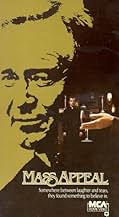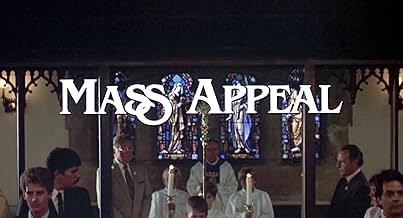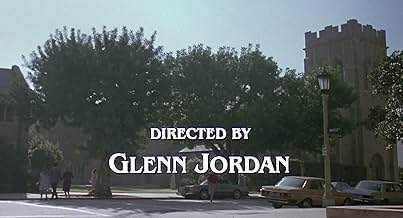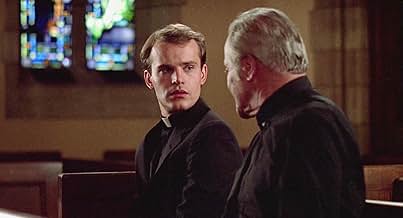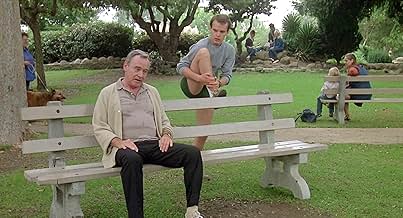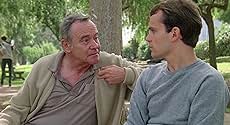IMDb RATING
6.7/10
1.2K
YOUR RATING
A popular Connecticut priest shields a seminary rebel from the wrath of a stern monsignor.A popular Connecticut priest shields a seminary rebel from the wrath of a stern monsignor.A popular Connecticut priest shields a seminary rebel from the wrath of a stern monsignor.
- Awards
- 1 win total
Featured reviews
Jack Lemmon shines as Father Farley, a spineless priest who'll say anything to anyone if it makes his life easier. Through a series of circumstances, he has to face himself as a result of being "assigned" Mark Dolson as a deacon.
When I first watched this movie, I was disappointed by the ending, because it didn't seem to resolve the main issue (which concerns Mark Dolson). But eventually I realized that it issue was Father Farley, and his spinelessness, and Mark Dolson was merely the means by which Farley is brought to terms with himself.
My second favorite movie of all time.
When I first watched this movie, I was disappointed by the ending, because it didn't seem to resolve the main issue (which concerns Mark Dolson). But eventually I realized that it issue was Father Farley, and his spinelessness, and Mark Dolson was merely the means by which Farley is brought to terms with himself.
My second favorite movie of all time.
The Catholic Church is as much, if not more, political than it is spiritual. As a young Catholic boy considering the priesthood yet conflicted between my own feelings and myself and that which the Church demanded, in the end I decided to go to high school instead of entering the Seminary.
I saw this movie as a young lay man. There was such a resonance for me as a Catholic and as a young man struggling with the Church, sexuality, and spirituality.
The pastor (Lemmon) was very much the pastor of a parish that was part of my experience. As much as he was devoted to his calling, he was also responsible for the political games that are played in everyone's life. The young seminarian (Ivenek) was honest, open and young with new ideas; everything the Church wanted to suppress.
The pastor wanted nothing more than to continue his comfortable position in his parish. He was assigned a new priest-to-be who had shown himself to be a bit of a radical at the seminary. It's not to be ignored the "office politics" that were in place in the assignment.
The elder was being punished and tested, so to speak, with the assignment of this younger priest. He did his best to impose his wisdom on the younger; but the younger sought spirituality more than acceptance of the status quo. In other words, he ruffled parishioners' feathers.
When complaints were lodged about this young radical priest, his sexuality came into question. What those "powers that be" were concerned about was this young priest's sermons and indictments of false spirituality dressed up as devotion. After all, if the Church had ever really been concerned with sexuality, there'd not have been a molestation of any alter boy.
This film shows how the Church picks and chooses who to persecute. Persecution of the parish priest for not playing the political games, persecution of the young seminarian who desires to spread the Word of God.
It also indicts us as parishioners. Do we go to church to be told what we want to hear or are we there to hear God's truth? Should our contributions to the collection plate influence what we hear; or should the Word of God actually mean something? This is a memorable movie in that it makes us think about what brings us to Church.
I saw this movie as a young lay man. There was such a resonance for me as a Catholic and as a young man struggling with the Church, sexuality, and spirituality.
The pastor (Lemmon) was very much the pastor of a parish that was part of my experience. As much as he was devoted to his calling, he was also responsible for the political games that are played in everyone's life. The young seminarian (Ivenek) was honest, open and young with new ideas; everything the Church wanted to suppress.
The pastor wanted nothing more than to continue his comfortable position in his parish. He was assigned a new priest-to-be who had shown himself to be a bit of a radical at the seminary. It's not to be ignored the "office politics" that were in place in the assignment.
The elder was being punished and tested, so to speak, with the assignment of this younger priest. He did his best to impose his wisdom on the younger; but the younger sought spirituality more than acceptance of the status quo. In other words, he ruffled parishioners' feathers.
When complaints were lodged about this young radical priest, his sexuality came into question. What those "powers that be" were concerned about was this young priest's sermons and indictments of false spirituality dressed up as devotion. After all, if the Church had ever really been concerned with sexuality, there'd not have been a molestation of any alter boy.
This film shows how the Church picks and chooses who to persecute. Persecution of the parish priest for not playing the political games, persecution of the young seminarian who desires to spread the Word of God.
It also indicts us as parishioners. Do we go to church to be told what we want to hear or are we there to hear God's truth? Should our contributions to the collection plate influence what we hear; or should the Word of God actually mean something? This is a memorable movie in that it makes us think about what brings us to Church.
Last night we showed `Mass Appeal' at our parish's monthly Movie Night - REEL Conversations. There was a mixed reaction from the viewers and some lively discussion afterwards.
Some questioned why Hollywood has trouble portraying Catholics (priests, monsignors, laity) in a positive light. We had difficulty coming up with a movie that showed a believer acting like a true believer. In this film, for example, in times of crisis or need, the characters don't turn to prayer for God's help. Seemed odd.
We very much enjoyed the dialog between the mentor priest and young seminarian. It was interesting to see the roles of the two alternate throughout the movie. Plenty of still-pertinent topics they covered (authority of the church, power, homosexuality, celibacy, sin, being lukewarm in one's faith) with some very interesting outcomes.
All in all, an enjoyable film with moments of great humor and warm sentiment. A fine choice for a group discussion. One that challenges your faith and is encouraging to those who believe.
Some questioned why Hollywood has trouble portraying Catholics (priests, monsignors, laity) in a positive light. We had difficulty coming up with a movie that showed a believer acting like a true believer. In this film, for example, in times of crisis or need, the characters don't turn to prayer for God's help. Seemed odd.
We very much enjoyed the dialog between the mentor priest and young seminarian. It was interesting to see the roles of the two alternate throughout the movie. Plenty of still-pertinent topics they covered (authority of the church, power, homosexuality, celibacy, sin, being lukewarm in one's faith) with some very interesting outcomes.
All in all, an enjoyable film with moments of great humor and warm sentiment. A fine choice for a group discussion. One that challenges your faith and is encouraging to those who believe.
"Mass Appeal" is enjoyable on several levels. It works as an examination of the depth of contemporary religious beliefs and their current role in our society, as an indictment of an inflexible system (the Catholic church), and as a comment on the travails of two very different men (ostensibly of the same "cloth") seeking spiritual happiness. Unfortunately, as a "mass appeal" film, not all of the issues are satisfactorily handled, but the film is entertaining nonetheless. Greg Cundiff's excellent review neatly summarizes some key plot issues and holes. For example, I found Ivanek's/Dolson's devotion and desire compelling, but what on earth would make him think that a parish of strangers would listen to his excoriations and then embrace him as their pastor? I agree with Cundiff that the lack of clarity surrounding this fundamental plot point does not help the film. I was also disappointed that Durning's character was unambiguously drawn as the heavy. A more balanced approach may have helped here. Farley's attempt at leading a discussion of the role of women priests is unusually framed, but ultimately leaves the viewer desiring a more compelling resolution to the issue.
Strongly on the plus side, Lemmon is an excellent choice for the lead (whi ch allows him to display his comic and dramatic talents equally). Farley's story is as compelling as Dolson's, and Lemmon squeezes every drop of drama from the script. His final "mass appeal" is quite affecting. Ivanek is intense as Dolson, but Charles Durning's role could be played by anyone. The film is nicely "shot" and has an exhilarating soundtrack at points.
A "7" out of "10."
Strongly on the plus side, Lemmon is an excellent choice for the lead (whi ch allows him to display his comic and dramatic talents equally). Farley's story is as compelling as Dolson's, and Lemmon squeezes every drop of drama from the script. His final "mass appeal" is quite affecting. Ivanek is intense as Dolson, but Charles Durning's role could be played by anyone. The film is nicely "shot" and has an exhilarating soundtrack at points.
A "7" out of "10."
Given all the revelations of sex abuse in the Catholic Church, Mass Appeal in its
own way is as dated as Going My Way in its picture of the Catholic Church and its
inner workings. Still the relationship of Jack Lemmon and Zeljko Ivanek isn't
exactly Bing Crosby and Barry Fitzgerald.
Playwright Bill C. Davis was hired to expand for the screen his two person play which 212 performances on Broadway in the 1981-82 season. It would hardly do to fill 100+ minutes of screen time with two priests just talking. Still the main focus is on popular parish priest Jack Lemmon and Zeljko Ivanek who is quite the oddball rebel at the seminary.
The monsignor in charge of the seminary Charles Durning wants Lemmon to take this kid in hand and explain the facts of life to him otherwise his ambition to be a priest will never be fulfilled. But as these two go back and forth one starts to wonder who is changing who.
On stage it worked to have the forces of repression as Ivanek sees them just be in the abstract. But for the screen Durning's role is critical in that the audience has to have the forces of oppression be personalized. Otherwise it would not have worked.
What the issues are I won't reveal, but as I said the sex abuse scandals have really dated Mass Appeal. Still it's a fine film with great performances from Lemmon, Ivanek, and Durning.
Playwright Bill C. Davis was hired to expand for the screen his two person play which 212 performances on Broadway in the 1981-82 season. It would hardly do to fill 100+ minutes of screen time with two priests just talking. Still the main focus is on popular parish priest Jack Lemmon and Zeljko Ivanek who is quite the oddball rebel at the seminary.
The monsignor in charge of the seminary Charles Durning wants Lemmon to take this kid in hand and explain the facts of life to him otherwise his ambition to be a priest will never be fulfilled. But as these two go back and forth one starts to wonder who is changing who.
On stage it worked to have the forces of repression as Ivanek sees them just be in the abstract. But for the screen Durning's role is critical in that the audience has to have the forces of oppression be personalized. Otherwise it would not have worked.
What the issues are I won't reveal, but as I said the sex abuse scandals have really dated Mass Appeal. Still it's a fine film with great performances from Lemmon, Ivanek, and Durning.
Did you know
- TriviaAccording to actor Zeljko Ivanek, the fish sermon scene was shot 15 times from three different angles. Although Ivanek considers the last take the best, most of it didn't make the final cut because it was too emotionally jarring for the audience.
- Quotes
Father Tim Farley: You're a lunatic! And Christ NEEDS lunatics. But the trouble with lunatics is, they don't know how to survive.
- Crazy creditsThis picture is dedicated to the memory of Ray A. Kroc.
- ConnectionsFeatured in At the Movies: Dune/Starman/Mass Appeal/Runaway (1984)
- How long is Mass Appeal?Powered by Alexa
Details
- Release date
- Country of origin
- Language
- Also known as
- Mass Appeal
- Filming locations
- Claremont, California, USA(myself, as I was an extra in this film)
- Production companies
- See more company credits at IMDbPro
Box office
- Budget
- $7,000,000 (estimated)
- Gross US & Canada
- $1,945,658
- Gross worldwide
- $1,945,658
Contribute to this page
Suggest an edit or add missing content


